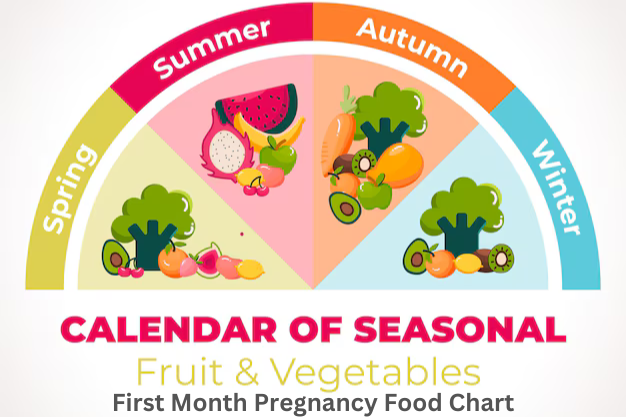First month Pregnancy Food Chart
The first month of pregnancy is a critical phase as your body begins adapting to nurture a new life. Proper nutrition plays a vital role in supporting your health and the development of your baby. At New World Fertility Centre, Delhi, we understand the importance of a balanced diet during this stage. Here’s a detailed guide to a first-month pregnancy food chart to help you make informed dietary choices.
Why Nutrition Matters in Early Pregnancy
Fetal Development: A nutrient-rich diet supports the development of vital organs and tissues.
Reduced Risk of Birth Defects: Certain nutrients, like folic acid, can help prevent neural tube defects.
Maternal Health: Good nutrition can help prevent complications like gestational diabetes and preeclampsia.
Essential Nutrients for the First Month
Folic Acid: Crucial for neural tube development. Found in leafy green vegetables, legumes, and fortified cereals.
Iron: Essential for oxygen transport to the fetus. Found in red meat, poultry, fish, and fortified cereals.
Calcium: Important for bone and tooth development. Found in dairy products, leafy green vegetables, and fortified foods.
Vitamin D: Aids in calcium absorption. Found in fatty fish, egg yolks, and fortified foods.
Protein: Builds and repairs tissues. Found in meat, poultry, fish, eggs, beans, and nuts.
Carbohydrates: Provide energy. Found in whole grains, fruits, and vegetables.
A Sample First-Month Food Chart
Here's a sample food chart to guide you:
1. Morning
Breakfast: Oatmeal with berries and nuts, or whole-grain toast with avocado and a boiled egg.
Mid-Morning Snack: A handful of almonds or a piece of fruit.
2. Afternoon
Lunch: Grilled chicken or fish with roasted vegetables and brown rice.
Evening Snack: Yogurt with honey and nuts, or a vegetable smoothie.
3. Evening
Dinner: Lentil soup with whole-grain bread, or vegetable curry with roti.
Bedtime Snack: A glass of warm milk.
Tips for a Healthy Pregnancy Diet:
Hydration: Drink plenty of water throughout the day.
Portion Control: Eat smaller, more frequent meals to avoid feeling too full.
Limit Processed Foods: Opt for whole, unprocessed foods.
Avoid Harmful Substances: Stay away from alcohol, smoking, and caffeine.
Consult a Dietitian: A registered dietitian can provide personalized advice.
Common Pregnancy Discomforts and Dietary Tips
Morning Sickness: Eat small, frequent meals, avoid greasy foods, and try ginger tea or ginger candies.
Fatigue: Prioritize sleep, eat regular meals, and stay hydrated.
Constipation: Increase fiber intake through fruits, vegetables, and whole grains. Drink plenty of water.
New World Fertility Centre, Delhi
At New World Fertility Centre, Delhi, we encourage all expecting mothers to follow a customized diet plan tailored to their needs. If you have specific dietary restrictions or concerns, consult our experts for personalized advice.
Frequently Asked Questions (FAQs)
1. What should I eat in the first month of pregnancy?
In the first month of pregnancy, focus on foods rich in folic acid, iron, calcium, protein, and fiber. Include leafy greens, whole grains, dairy products, lentils, fruits, vegetables, and lean proteins in your diet. Avoid processed and junk foods.
2. What are the best fruits to eat during the first month of pregnancy?
Some of the best fruits to eat during early pregnancy include:
- Bananas (for energy and potassium).
- Oranges (for vitamin C and hydration).
- Apples (for fiber).
- Berries (rich in antioxidants).
- Avocados (high in healthy fats and folate).
3. Is it safe to drink milk in the first month of pregnancy?
Yes, milk is safe and beneficial during pregnancy as it is a good source of calcium, protein, and vitamin D. Opt for pasteurized milk to avoid harmful bacteria.
4. What foods should I avoid during the first month of pregnancy?
Avoid these foods during the first month:
- Raw or undercooked meats, eggs, and fish.
- High-mercury fish (e.g., swordfish, shark).
- Unpasteurized dairy products.
- Caffeine and alcohol.
- Junk food and artificial sweeteners.
5. Can I have coffee during pregnancy?
You should limit caffeine intake during pregnancy. If you crave coffee, restrict it to one cup per day (less than 200 mg of caffeine). Excess caffeine can increase the risk of complications.

 Jul-25-2025
Jul-25-2025